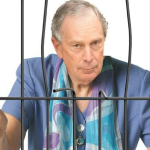 New Yorkers riding public transportation will see new gross-out advertisements from New York City’s Department of Health and Mental Hygiene — the same entity tasked with imposing a soda ban on city restaurants before it was invalidated by a state judge — that continue a campaign the city’s own scientists warned was unscientific. Commuters will be “warned” that their sports drinks, fruit beverages, and iced teas will turn into fat, just like colas, despite a city nutritionist warning her colleagues that “the idea of a sugary drink becoming fat is absurd” when the campaign debuted.
New Yorkers riding public transportation will see new gross-out advertisements from New York City’s Department of Health and Mental Hygiene — the same entity tasked with imposing a soda ban on city restaurants before it was invalidated by a state judge — that continue a campaign the city’s own scientists warned was unscientific. Commuters will be “warned” that their sports drinks, fruit beverages, and iced teas will turn into fat, just like colas, despite a city nutritionist warning her colleagues that “the idea of a sugary drink becoming fat is absurd” when the campaign debuted.
New Yorkers must be so happy to have paid for them. And you could have to pay too, if Marion Nestle gets her way and Congress enacts a federal slush fund for activists’ food fights.
Behind the scientific dubiousness of the city’s hyperbolic images, there is a micron of truth in what the city is trying to say. New York and the activist community place such an emphasis on freezing and polarizing one beverage class (soda), but people aren’t changing their calorie consumption much. Even if they drink less soda, they are drinking other caloric beverages, using their change in beverage choices as an excuse not to exercise, or substituting other food items instead. (We wonder how much effect unfounded scares against zero-calorie sweeteners like those spouted by the Center for Science in the Public Interest might have had to do with that.) Since the calorie balance doesn’t change, people don’t lose weight.
New York City’s solution is to convince kids to switch to seltzer water, skim milk, or tap water. (Kids? Seltzer water?) A better way to fight obesity among children rather than attacking single products would be to promote physical activity, which the Centers for Disease Control’s former chief obesity cop notes “plays a major role in the prevention of chronic diseases, including obesity.”
Unfortunately, targeting “calories out” by recommending more physical education, after-school sports, and dog walks doesn’t let a city bureaucracy become an “administrative Leviathan” (to quote the judge’s characterization of the soda ban enforcement scheme). And there is a whole school of economics called public choice that reasons that a bureaucracy wants nothing more than exactly that. If New York’s Department of Mental Hygiene doesn’t, it isn’t trying hard to shake the impression.




